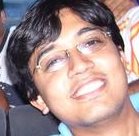03 September 2013
Read 3 very interesting articles on EDGE.ORG, one of my favoritest website. And would like to put the crux of the 3 articles here for all to appreciate.
1. Moral Tribes - Though the topic name was "deep pragmatism", I am naming it on a book written by the author (Joshua Greene). Here are the 2 broad ideas that he discusses.
You are a group of ten people. Everyone has 2 rupees. Everyone can pull in money in the pull, as much as he wants, the pooled money will be doubled and redistributed amongst everyone equally. You are free to keep as much money as you want out of the 2 rupees? So will you give your 2 rupees. The ethical dilemma here is about individual good vs. group's good. If you keep your 2 rupees to yourself, and everyone else gives there, you are bound to benefit more without having to take a risk.
ANother situation is, if you have a child drowning infront of view, will you spoil your 500$ suit to save the child. Answer is for sure Yes. And then there is a situation in some remote country in Africa where a child or 2 can be saved iwth that 500$, will you give the money? answer is may be? ... reason he sites is , our moral instincts are bound by our surroundings / groups. It becomes us vs. them.
So he talks of 2 issues " Tragedy of commons" and "Tragedy of common sense morality"
2. Chinese Eugenics: this is one of the responses as a part of "what you should be worried of ?" Eugenics is an idea of discouraging reproduction of people with genetic defects and promoting reproduction in "better" of the breed. China is one of the biggest study centers for genomic studies. And there is a lot happening there, as the author puts :
Chinese propaganda urges couples to have children "later, longer, fewer, better"—at a later age, with a longer interval between birth, resulting in fewer children of higher quality. With the 1995 Maternal and Infant Health Law (known as the Eugenic Law until Western opposition forced a name change), China forbade people carrying heritable mental or physical disorders from marrying, and promoted mass prenatal ultrasound testing for birth defects. Deng also encouraged assortative mating through promoting urbanization and higher education, so bright, hard-working young people could meet each other more easily, increasing the proportion of children who would be at the upper extremes of intelligence and conscientiousness.
Potentially, the results would allow all Chinese couples to maximize the intelligence of their offspring by selecting among their own fertilized eggs for the one or two that include the highest likelihood of the highest intelligence. Given the Mendelian genetic lottery, the kids produced by any one couple typically differ by 5 to 15 IQ points. So this method of "preimplantation embryo selection" might allow IQ within every Chinese family to increase by 5 to 15 IQ points per generation. After a couple of generations, it would be game over for Western global competitiveness.
3. Technology and Innovation as a National Development Strategy : A monologue by a scientist David Sengeh from Sierra Leone. The author is a 3d printing student and talks about how innovation and technology - the process of setting it up as a thought process in the minds of people, should be a national development strategy rather than borrowing the technology from one place ot another. THe problems and issues in Sierra leone he says would be different from that in USA. So even if you give Sierra Leone billions of dollars , creating a Silicon valley there might not be possible. Every country should identify their problems and promote entreprenuers who wants to solve problems, is his line of argument


No comments:
Post a Comment